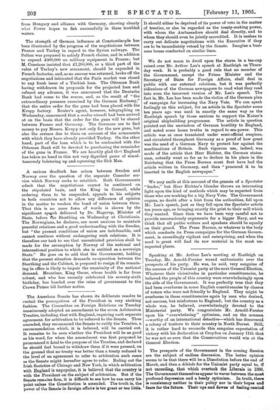The American Senate has shown its deliberate resolve to curtail
the prerogatives of the President in very striking fashion. The Committee on Foreign Relations on Tuesday unanimously adopted an amendment to the seven Arbitration Treaties, including that with England, requiring each separate agreement for arbitration to be referred to the Senate. Thus amended, they recommend the Senate to ratify the Treaties, a recommendation which, it is believed, will be carried out. It remains to be seen whether the President will be as good as his word, for when the amendment was first proposed he pronounced it fatal to the purpose of the Treaties, and declared he should feel bound to withdraw them if it were pressed, on the ground that no treaty was better than a treaty reduced to the level of an agreement to refer to arbitration such cases as the Senate might hereafter agree to refer. Ruling out the Irish Societies of Chicago and New York, in which arbitration with England is unpopular, it is believed that the country is with the President on the subject of arbitration. But if the Senate remains firm, it is difficult to see how he can carry his point unless the Constitution is amended. The truth is, the power of the Senate in foreign affairs is too great or too little.
It should either be deprived of its power of veto in the matter of treaties, or else be regarded as the treaty-making power, with whom the Ambassadors should deal directly, and to whom they should even be jointly accredited. It is useless to carry out delicate negotiations with the Executive if they are to be immediately vetoed by the Senate. Imagine a busi- ness house conducted on similar lines.






































 Previous page
Previous page